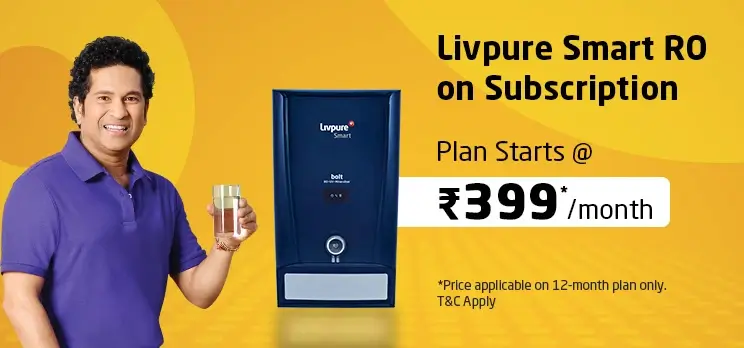Gravity-Based Water Purifier – It’s Advantages & Disadvantages
Clean drinking water is one of the most basic necessities for human beings. An average healthy adult should drink at least 6-8 glasses of water a day. But unfortunately, not everyone has access to safe drinking water. Due to the rise in environmental pollution, the availability of clean water is now a pressing concern. The majority of natural water resources are getting polluted, contributing to this problem. Consuming this contaminated water can cause a number of infections and waterborne diseases. In such a situation, the need for effective water purification arises, and this is when water purifiers come into play.
Nowadays, a large number of options are available in the market when it comes to finding the best RO water purifier for your home. All of them are equipped with advanced technologies and can get rid of almost all kinds of impurities. with more and more people preferring sustainable solutions these days, gravity-based water purifiers are gaining popularity. Also referred to as non-electric water purifiers, these filters function without electricity.
But what exactly are gravity-based water purifiers and their advantages/disadvantages? Here is a detailed explanation of all these things:
What is Gravity-based Water Purifier?
A gravity water purifier, as the name suggests, uses gravity as its main working principle. These purifiers effectively purify regular tap water to make it fit for consumption. Since these water purifiers are non-electric, they are successful in areas with an electricity shortage. If you are looking for an affordable solution that works without electricity, you can definitely consider installing a non-electric RO water purifier.
A non-electric water purifier can disinfect the water to a great extent as it easily eliminates all types of physical impurities. There are no perceptible disadvantages of gravity-based water purifiers however, they do have certain limitations. These purifiers do not work for more contaminated water that has harmful metals or other chemical pollutants. So, gravity-based water purifiers work best in areas where the TDS level of the water is low.
Also read: Difference Between RO, UV and UF Water Purification Technologies
How does Gravity Water Purifier Work?

In a gravity-based water purifier, contaminated water is allowed to move from a higher container to a lower one. Here, the water flows from top to bottom under the effect of gravity, and this process does not require any external force. Generally, these purifiers use activated carbon or a fibre mesh to filter the contaminated water. Activated carbon is known for its clarifying properties. It can quickly absorb physical impurities and pollutants such as chlorine, etc., from the water. Fibre mesh, on the other hand, is a different kind of cloth that works as a physical barrier and removes visible dirt and other particles from water.
Some of the latest models of gravity-based water purifiers also use UF technology. The UF membrane acts as a barrier to eliminate any kind of impurity from the water. This membrane consists of several small pores (usually 0.1 microns in size). It can easily filter out bacteria, cysts, and other microorganisms from water and make it suitable for consumption.
Advantages of Gravity Water Purifier
Some of the main advantages of using a gravity water filter for the home are:
- Lower Cost – As compared to electric water purifiers, gravity-based, non-electric water purifiers are relatively inexpensive. So, you don’t have to pay a hefty amount if you plan to make an outright purchase.
- Effective Purification– Gravity water purifiers can easily remove all kinds of suspended particles from water and make it suitable for consumption.
- Simple Operation: These purifiers are easy to use. You pour water into the top chamber, and it gradually flows through the filters by gravity. There are no complex settings or installation procedures involved.
- Easy Maintenance – Due to their simple structure and functionality, these water purifiers are very easy to use and maintain. Apart from this, the regular maintenance cost is also relatively lower.
- Portability – Another major advantage of these water filters is that they are easily portable. This is what makes them suitable for people who might have to shift from one place to another.
Disadvantages of Gravity Water Purifier
Gravity-based water purifiers are popular for their simplicity and cost-effectiveness, but they do come with some disadvantages:
- Limited Filtration: Gravity-based purifiers typically use basic filters like activated carbon and ceramic filters. While they can remove certain impurities, they may not be as effective as advanced purification methods like RO (Reverse Osmosis) in removing all types of contaminants, including dissolved salts and heavy metals.
- Slow Filtration: Gravity-based purifiers rely on the force of gravity to filter water, which can be a slow process. It may take hours to filter a significant quantity of water, making them less suitable for households with high water consumption.
- Limited Storage Capacity: These purifiers often have limited storage capacity, which can be insufficient for larger families or during periods of high water demand. Users may need to refill the purifier frequently.
- Maintenance: Regular cleaning and maintenance of the filters are essential to prevent clogging and ensure effective purification. Neglecting maintenance can lead to a decrease in filtration efficiency.
- No Removal of TDS: Gravity-based purifiers do not remove Total Dissolved Solids (TDS) from water. If the TDS levels are high, the purified water may still contain minerals and salts that affect taste and quality.
- Susceptible to Contamination: As these purifiers have open containers for storing untreated water, there’s a risk of recontamination if the containers or surroundings are not kept clean.
- Not Suitable for Highly Contaminated Water: In areas with severely contaminated water sources, gravity-based purifiers may not provide adequate purification, and more advanced systems like RO purifiers may be necessary.
With so much to offer, gravity-based water purifiers are definitely worth a try. To find the best gravity-based non-electric water filter for your home, explore the extensive range of options offered by Livpure Smart. Equipped with modern filtration technology and several advanced features, our water purifiers are available with easy subscription plans and zero hidden charges. The best thing is that you can control and monitor them using the Livpure Smart app. This app also provides information such as the amount of water being consumed, water filter life, routine maintenance, service schedules, etc.







